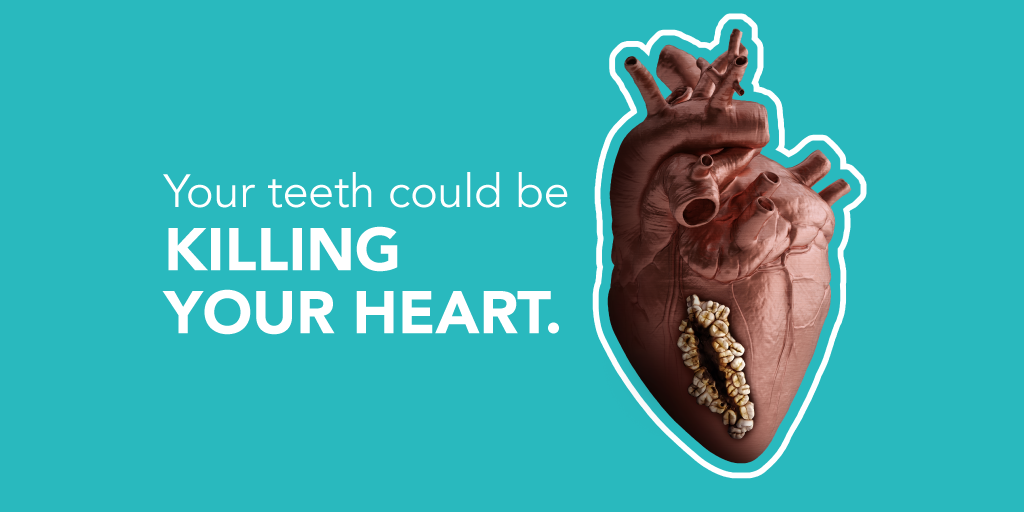Yes, you read the topic of the blog article correctly and yes it is true! There have been numerous types of research conducted that link your oral health, especially the health of your root canals and gums to your cardiovascular health. While this may be a rather surprising connection, your oral health and your cardiac health do go hand in hand.
The Connection explained…
The culprit is bacteria. Poor oral health makes your mouth the ideal breeding ground for bacteria. This bacteria can cause inflammation, spreading to other parts of your body through your blood vessels hence causing an infection of the blood is known as sepsis. This can progress into septic shock which can be deadly due to the increased risk of multi-organ failure.
Your teeth have started killing your heart…
Signs you could be septic:
- Change in mental status
- Fast, shallow breathing
- Sweating for no clear reason
- Feeling lightheaded
- Shivering
When you have an infection in your heart it usually presents with the following symptoms:
- Chest pain
- Fatigue
- Fever
- Fluid buildup (oedema) in the legs, ankles, feet or abdomen
- Joint pain or body aches
- Night sweats
- Rapid heartbeat (arrhythmia) or pounding heartbeat (heart palpitations)
- Shortness of breath (dyspnea)
Research has shown that heart infections like Endocarditis can be caused by poor dental hygiene (bleeding gums). This then causes the bacteria to enter your bloodstream leading to the infection.
When your CRP is through the roof…
The method of confirming that your decaying teeth are now starting to decay the rest of your insides is through a CRP test. An elevated CRP level indicates that your body is fighting against an infection.
Elevated CRP levels lead to vascular damage increasing your chances of a heart attack or a stroke. If you have been prescribed such a test, Durdans Labs will be of service to you. If you would like more information regarding the test, text ‘Hi’ to https://wa.me/94112140000?text=Hi.
A pretty smile and a healthy heart…
- Brush and floss regularly: Brushing your teeth twice a day and flossing once a day can help remove plaque and prevent gum disease.
- Visit your dentist regularly: Regular dental checkups can help detect and treat oral health problems before they become serious.
- Quit smoking: Smoking can increase your risk of gum disease and heart disease.
- Eat a healthy diet: A diet rich in fruits, vegetables, and whole grains can help keep your mouth and heart healthy.
- Manage your stress: Stress can contribute to both gum disease and heart disease, so finding ways to manage your stress can be beneficial.
Follow these tips to maintain both your oral and heart health. If you wish to seek medical attention for your oral health call our dental clinic +94 74 281 6952 and for a heart health check or a consultation with a cardiologist call +94 71 682 7916. If calling isn’t really convenient for you, book an appointment through our chatbot; text ‘Hi’ to https://wa.me/94112140000?text=Hi.
References
https://www.mayoclinic.org/diseases-conditions/sepsis/symptoms-causes/syc-20351214
https://my.clevelandclinic.org/health/diseases/22054-heart-infection
Desvarieux M, Demmer RT, Rundek T, et al. Relationship between periodontal disease, tooth loss, and carotid artery plaque: the Oral Infections and Vascular Disease Epidemiology Study (INVEST). Stroke. 2003;34(9):2120-2125.
Lockhart PB, Bolger AF, Papapanou PN, et al. Periodontal disease and atherosclerotic vascular disease: does the evidence support an independent association?: a scientific statement from the American Heart Association. Circulation. 2012;125(20):2520-2544.
Piconi S, Trabattoni D, Luraghi C, et al. Treatment of periodontal disease results in improvements in endothelial dysfunction and reduction of the carotid intima-media thickness. FASEB J. 2009;23(4):1196-1204.













